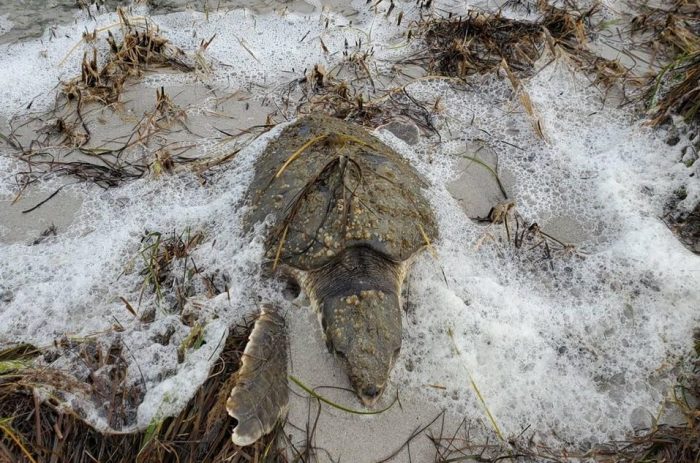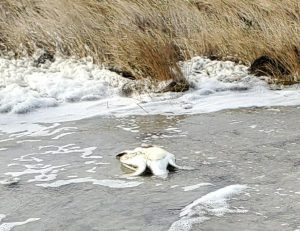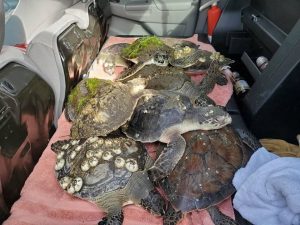
Nearly 100 cold-stunned sea turtles were found and transported to the Network for Endangered Sea Turtles (NEST) Rehabilitation Center at the N.C. Aquarium on Roanoke Island, after two days of cold temperatures that led to approximately 89 sea turtles being rescued on Tuesday alone.
The coordinated effort by local and northern Outer Banks volunteers, (which is orchestrated by the North Carolina Wildlife Resources Commission), is a regular endeavor during the winter months, when the occasional freeze can affect mainly juvenile sea turtles in the Pamlico Sound.

Frank Welles, NEST Hatteras Island Coordinator, reported that during this recent cold-weather event, several dozen volunteers headed to the Pamlico Sound waters to look for the sea turtles that were impacted by the cold.
“When we’re having a cold front, we all coordinate,” said Welles. “The North Carolina Wildlife Resource Commission is in charge, and are the lead coordinators, and they are absolutely wonderful to work with.”
Eight or nine sea turtles were recovered on Monday afternoon when air temperatures dropped to the mid-30s for the majority of the day, but it was Tuesday that brought the most activity, and which resembled the “Turtle Apocalypse” of 2016, where volunteers recovered 250 turtles in two days due to freezing weather conditions.
“It’s the biggest day we’ve had since 2016 during that massive event,” said Welles. “I don’t think we’ve had this many since then. In December, we were just over 100 [rescued turtles], but that took three days. Today, we had at least 89 in a single day.”
As cold-blooded reptiles, sea turtles derive heat from their surroundings, and when they become too cold, their metabolism slows, prohibiting them from moving and ultimately from migrating to warmer waters. This cold-stunned scenario can turn deadly, as once in an immobile and lethargic state, the sea turtles can have difficulty raising their heads above water to breathe, and can eventually drown.
The volunteers primarily search for stranded turtles along the soundside, covering private property in the villages and those not patrolled by the National Park Service (NPS), although NPS biotechs help whenever possible, and they leant a hand on Tuesday patrolling southern Hatteras Island and areas north of Avon.
The initiative launches from a central staging area in Buxton, and Welles reported that during Tuesday’s efforts, volunteers covered miles of shoreline from Salvo to the tip of Hatteras village.
“One of the curiosities this time is they were washing in as we walked the beaches,” said Welles. “We’d turn around after stopping at the car, and there’d be another one washing up that wasn’t there [moments before.]”

Once a sea turtle is found, volunteers determine the type of turtle and its condition, and they also measure the turtle and provide its location before transportation, The live turtles are then taken to the STAR Center in Manteo to undergo rehabilitation, and to eventually recover and be returned to the local shoreline.
On this most recent event, the STAR Center already had a number of formerly cold-stunned sea turtle patients that were slated to be released. However, due to the recent wave of bad and windy weather, the mass releases were postponed, and the healthy turtles in residence had to be temporarily relocated to other North Carolina aquariums along the state’s coastline to make room for the new patients.
“The state had cleared some at the [North Carolina Aquarium at Roanoke Island] for release, but they moved them to southern aquariums this afternoon,” said Welles. “The other aquariums in the state can handle healthy turtles, but are unable to do rehab.”
“But our aquarium does such a wonderful job in [this arena]… The rehab director, you can’t slow her down – no matter what we send her, she keeps on smiling,” he added, referring to STAR Center Manager Amber White.
Welles also stated that the team – which includes STAR Center volunteers, NPS Biotechs, the N.C. Wildlife Resources Commission, and Hatteras Island Wildlife Rehabilitation’s Lou Browning – will be back at it again tomorrow, as temperatures are forecasted to stay frigid.
It’s a tough and continual job, especially considering how hard volunteers worked on Tuesday, but by that same afternoon, Welles reported that all of the roughly 89 turtles recovered had already been processed at the STAR Center.
“We had a few rescues yesterday, but I think we were all overwhelmed after today,” said Welles. “The northeast wind is supposed to continue, and the water hasn’t warmed up, so I expect that tomorrow we’ll have at least a few more.”
“But today went wonderfully,” he said. “When it’s cold, we all work together… and we do it well.”
How You Can Help:
- If you spot a cold-stunned sea turtle in or along the Pamlico Sound, contact the 24-hour NEST hotline at 252-441-8622.
- For more information on NEST, and to make a donation or learn about volunteer opportunities, visit http://www.nestonline.org/.
- For more information on Hatteras Island Wildlife Rehabilitation and / or to inquire about making a donation, visit their Facebook page at https://www.facebook.com/pg/Hatteras-Island-Wildlife-Rehabilitation-316636688958/.
- To make a donation to Outer Banks Wild Care, which also provides rehabilitation services on Hatteras Island, mail checks to Outer Banks Wild Care, P.O. Box 324 Buxton, NC, or donate via their PayPal account at outerbankswildcare@centurylink.net










I thought they were extinct!!!
I’m all for aiding the sea turtles, but every year when we get the reports of cold-stunned turtles, the first thing that comes to mind is a question: What did the turtles do before man was around (or aware) to be of help?